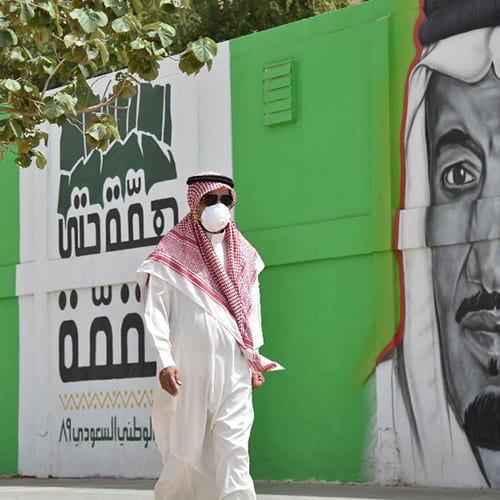By Jim Krane, Ph.D.
Wallace S. Wilson Fellow for Energy Studies
Kristian Coates Ulrichsen, Ph.D.
Fellow for the Middle East
Leveraging a crash in oil revenue, the Saudi government has quickly imposed unprecedented changes to the way it raises cash, by raising taxes and slashing subsidies in ways Saudi citizens once considered unthinkable.
If the changes in the $27 billion austerity package are permanent, once tax-free Saudi Arabia will soon become a very different place.
The big ticket item is a 15% value added tax on nearly every good and service provided in the kingdom – including gasoline, food, housing sales and private healthcare. The VAT was controversial enough when introduced at 5% in 2018. In July, the rate triples.
The kingdom’s much discussed economic diversification program, Vision 2030, has been placed on hold, with $8 billion in spending cut. A $270 monthly cost of living allowance for government employees, in place since government subsidies were rolled back in 2018, has also been axed.
For Saudis used to a one-way flow of cash – from the state treasury to their wallets – these changes must feel strange.
Since the 1970s oil boom, the kingdom has asked its citizens for little or no financial help. Saudis may not have enjoyed the right to elect their kings, but the monarchs sought legitimacy by channeling generous oil profits to provide juicy social benefits and tax-free salaries.
But since the reign of King Salman and the fast-paced diversification efforts overseen by his son, Crown Prince Mohammed bin Salman, longtime tenets of the social contract have been rolled back or eliminated.
Many Saudis are responding by Tweeting pictures of the former king, Abdullah, known for his concern for the poor.
Salman’s structural changes to the social contract started with the elimination of energy subsidies. In 2016 and 2018, he and MbS raised prices on energy products and services across the board. Gasoline, electricity, desalinated water, and natural gas went from ridiculous lows to something closer to world market prices.
Also in 2018, MbS introduced the VAT. So did the UAE and, later, Bahrain. Thus far none of the other Gulf monarchies has adopted the Saudi VAT increase, although one regional columnist argues that it’s a matter of time.
The dire economic situation provides the Saudi government a window of opportunity to introduce politically sensitive measures that would be unthinkable in times of plenty.
Fact is, the coronavirus hit the kingdom much harder than most countries. The public health crisis has shuttered the local economy and halted international travel to Mecca and Medina, while Saudi Aramco’s first quarter profit dropped by 25%, hammering state finances. The second quarter will look much worse. So, the sheikhs have to respond.
When the dust settles, Saudi Arabia will be different.
The old rentier state rules prohibiting “taxation without representation” are being tossed out the window. Academics have long argued, with some support among Saudi citizens, that the public will demand political participation – some form of voting – in return for giving up tax-free lifestyles.
That is not happening. Thus far, the state has compensated with a combination of stipends for the poor, an increase in social freedoms (movies and women driving), and stepped-up repression. These moves have kept Saudis from making too much noise about austerity.
The overall effect amounts to a rapid remaking of the state-society social contract. Popular but economically disastrous in-kind subsidies – free or cheap energy, food, housing, and low-effort jobs – are giving way to personal self-sufficiency. Labor market reforms are taxing expatriate workers and pushing Saudis into the private sector, helped by moves like banning foreigners from driving for Uber, for instance.
These are major shifts that would be best discussed publicly, rather than being rolled out under the cover of low oil price austerity. Thus far, other than some grumbling on Twitter, Saudi society has been quiet.
Many in Saudi Arabia, particularly young people, have been willing MbS to succeed because they, too, recognize that the economic status quo is unsustainable. MbS has staked his credibility on his ability – and his alone – to transform and diversify the Saudi economy.
Yet the economic impact of coronavirus falls hardest on the sectors that MbS had earmarked as priorities for Vision 2030, such as tourism, hospitality, entertainment, and the NEOM future city on the Red Sea. What if MbS’ reforms fail? Low oil prices weren’t part of the plan.
It would seem that market-based reforms are inevitable. A researcher at a Riyadh investment bank told one of us that the kingdom wants to convert most of its $350 billion in yearly social welfare spending to cash stipends under the Citizens Account program.
But when you tinker with the social contract, society is going to demand a say.
In most places, major shifts in social policy are done with full input from society, usually through the ballot box. In Saudi Arabia and autocracies like it, there are fewer avenues for public input.
MbS has based his top-down “revolution” on his ability to improve the everyday prospects of average Saudis. The pandemic and the evaporation of oil revenues challenge the crown prince’s goals, and, eventually, his support base.
All regimes rely on a combination of consent and coercion, but any erosion of the former could leave MbS dangerously reliant on the latter. The question then becomes, what next?
One way or another, the people will have their say.
This post originally appeared on the Forbes blog on May 13, 2020.
